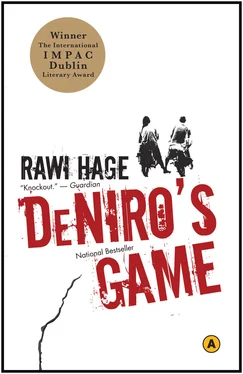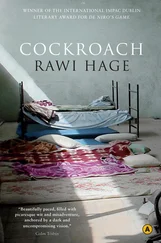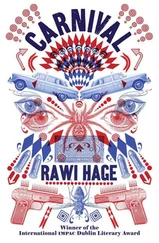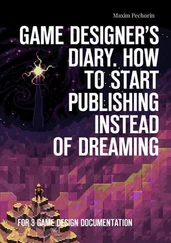I rushed to my bed and fell onto it, feeling sick and deeply anxious. I reached for the phone and lifted the receiver. The Arab downstairs answered me.
Do you have vinegar? I asked him. I wanted to wet a piece of cloth with vinegar and lay it on my forehead, just as my grandmother had done when I was young and had a deadly fever.
Vinegar? he repeated. This is a hotel. We do not have vinegar.
Khall , I said.
The receptionist hung up. I threw the phone on the floor and walked toward the bathroom. There, I peeked out the window: outside, the sand was blowing spray like crashing sea waves at docks and ports. Far away in the desert I saw Rommel and his men moving toward the east. I held my gun and dug under the window, and waited for their passage.
The partridge flew down and landed on the windowsill. I will tell you when they pass , it told me.
I WOKE UP A while later, not knowing what time it was. My shirt was soaked. A desert thirst made me rush to the bathroom. I filled a glass from the well and drank. I looked in the mirror: my hair was wet and my body was skinny; my round eyes were red and sunk beneath the yellow skin of my high cheekbones. My clothes were covered in dust. I must have crawled in the boiling sand, I thought, under the enemy’s eyes. I must have escaped from beneath my enemy’s long leather boots.
I took a shower, and under the water I felt my forehead. The fever had gone. When I got out of the shower, I looked for my watch. It was four in the afternoon, but that did not help me much because I could not remember when, exactly, Paris had started to move south, or when it had finally deserted its colonies and slid back north.
I called the Algerian downstairs and asked him if he remembered what day it had been when I asked for vinegar. He laughed and did not answer the question. Instead, he asked me if I had finished my book.
No, I said.
MOTHER DIED TODAY. Or maybe yesterday; I can’t be sure .
The first sentence of the book played in my head again and again until I started to laugh at its absurdity. I laughed at the memory of my mother’s distant cousin, who had come from the north dressed all in black, and in a melodramatic act of lamentation had thrown herself on my mother’s open coffin and had a conversation with her. She had told my mother that her son, Bassam, was still here, but was alone now, and she had reminded my mother how young she was for death, which made all the women in black shriek and shed tears in their handkerchiefs. The image of women surrounding my moth-er’s corpse, dressed all in black, all in tears, all sipping coffee, all kissing me on the forehead, all chanting and beating their chests, made me want to laugh even more. And I remembered Father Semaan, the bearded, short, fat priest who came to my room swinging his incense on my teenager’s posters of halfnaked girls and football players, and also on the pigeons outside my window, who, when they saw his fire and smoke, flew up in flocks and perched on the opposite roof, ogling him cockeyed. All I had wanted was for the crowd to leave the house. I had not been certain about when my mother had died — whether it was today or yesterday or even the day before. And here they were, these women, talking to her as if she were still there and listening. They helped themselves to the kitchen coffee and the cigarettes, and opened the fridge, hoping for cold water, reviving one another with rosewater, fainting like Italian opera singers, wailing. And all I saw that day of my mother’s funeral was a black drape stretched over many tearful heads, all bound under one black sheet, moving in agony like a swaying, injured beast. Then the men came and made their way through the women’s black robes, lifting the coffin with twelve arms, and my mother floated her way to the cemetery along streets filled with cars and nosy neigh-bours perched on balconies like half-vulture, half-human beings with curved claws. I had walked in the procession and looked at the wreaths with white ribbons across their middles, with their dedications and mourners’ names. I had walked, and when I realized that someone was holding my arm for fear that I might faint, slip, or crawl behind the coffin, I had looked that person in the eye and asked for a cigarette.
IN PARIS, THE SOFT evening light crawled along the surface of the sidewalks, and a breeze rose outside, and up wafted the smell of the freshly wet streets. I opened a drawer, pulled out an envelope, and counted my money. I might have enough for another week, maybe more, I thought. The room was rented for a few more days, but I did not expect Rhea to renew it.
I took my money and went downstairs. The Algerian had left, and another man, a Senegalese, was sitting in his place. I asked him to extend my stay for another week, under the same name.
Who is Rhea? he asked. The room is under Rhea Mani’s name.
My girlfriend, I said.
He nodded, asked nothing more, and filled out some papers. I paid him and left. Outside, I went searching for food. The shadows of lamp poles were reflected on the wet streets in obscure shapes; they looked like serpentine ghosts in trench coats, with burning hair.
I bought a baguette with a saucisse inside. Then I walked to the river, leaned on the rail, and buried the baguette in my stomach.
The palaces across the river were lit with green and red lights. Above, foggy weather brought the sky lower and made the city look confined and humble.
I took the steps down to the river’s edge and sat on a bench and waited for the fog to descend and touch the water.
Now, I thought, all is invisible; all is hidden from laws, eyes, perception. This must be death, where nothing is seen.
I wore the fog as a garment and walked with it into the night.
THE NEXT DAY, the phone rang. The Algerian said, Une nana t’attend en bas. Elle veut que tu descendes .
I knew it was Rhea. I put her father’s pants on and ran barefoot down the stairs. She was in the lobby, talking to the man I had mugged a couple of nights before. They both looked at me in silence, then looked at each other.
Do you have time to come for a coffee with us? Rhea asked in a brisk, businesslike tone.
Yes, I will be right back, I replied.
I put on my socks and shoes, and her father’s shirt, which I had washed but had not ironed. Outside the hotel, the man stared at me in silence, with an expressionless face. We walked together to a café and sat down.
Rhea gave me a reproving look, and with a tight jaw, she said, Do you have Roland’s lighter?
I pulled it from my pocket and gave it back to him.
And the gun? Where did you get the gun? she asked.
Beirut.
You entered the country with a gun? Roland asked with a smirk on his face.
Yes, I did.
Carrying a gun in this country is a serious matter, Roland said.
I shrugged my shoulders.
Rhea squeezed my arm from across the table and said forcefully, You listen to him, Bassam. Roland knows what he is talking about! Listen to him.
Roland looked around, as if informers were surrounding us. He said, You have to get rid of it. Do you have it now in your bag?
Yes, I do.
C’est pas vrai! Rhea shouted. She pulled her upper body back and slammed her hand on the little round table. Mais, c’est ridicule, non?
Go tonight and throw it in the river, Roland whispered to me.
Listen to him, Rhea said again. Listen to him. He knows.
Go throw it in the river and all is forgiven, Roland said. He went to the counter and paid the bill.
Rhea looked down at her fingernails. She avoided my eyes, and her soft hair veiled her face. All around us mutters, whispers, and murmurs blended with the clatter of utensils, cigarette smoke that escaped lovers’ sighs, and soft, sad, singing accordions that accompanied our uneasiness and silence.
Читать дальше












